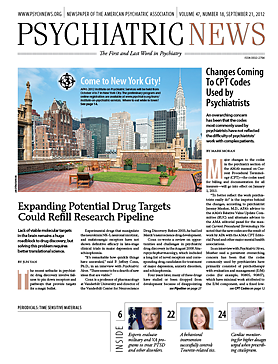The association of posttraumatic stress disorder (PTSD) with substance dependence is no random pairing.
As many as 65 percent of patients with PTSD have a comorbid substance use disorder, and up to 62 percent of people with substance dependence have PTSD, according to sources cited by Katherine Mills, Ph.D., in a new study of combined PTSD/substance dependence therapy. Mills is a senior lecturer in the National Drug and Alcohol Research Centre at the University of New South Wales in Sydney, Australia.
“Substance abuse may follow PTSD as a way of coping with stress or as an avoidance strategy,” noted Paula Schnurr, Ph.D. “Or it can predate and lead to PTSD by encouraging risky behavior that results in trauma.”
However, many clinicians have worried that exposure-based therapy could increase those stresses and cause patients to revert to primary coping strategies such as substance abuse, said Schnurr, deputy executive director of the Department of Veterans Affairs’ National Center for PTSD in White River Junction, Vt., and a research professor of psychiatry at Dartmouth Medical School, in an interview with Psychiatric News.
Nevertheless, exposure-based therapies are the standard for treating PTSD, and conventional wisdom has held that prolonged exposure should be used only with patients who have been off substances for some time.
The truth of that belief was unknown, however, since substance-dependent subjects have usually been excluded from other than pilot studies of combined therapies.
Now Mills and colleagues have presented evidence indicating that such fears may be misplaced.
The researchers randomized 103 patients to receive either “usual treatment” for substance dependence—that is, anything available in the community, or usual treatment plus a modified version of COPE—Concurrent Treatment of PTSD and Cocaine Dependence.
The participants were 34 years old on average; 62 percent were women and 80 percent had a history of injection drug use. Most had experienced noncombat trauma exposure, such as sexual or physical assault, or accidents or disasters.
The COPE protocol included 13 individual sessions with a therapist, cognitive-behavioral therapy for substance use, psychoeducation, and in-vivo and imaginal exposure.
After nine months of treatment, symptom severity had decreased in both groups. “However, the treatment group demonstrated a significantly greater reduction in PTSD symptom severity,” said the researchers in the August 15 Journal of the American Medical Association.
There was also no significant difference in changes in substance use or in depression, or anxiety symptoms, but those symptoms did not worsen either.
“The complex trauma, substance use, and psychiatric presentations commonly found among individuals with PTSD and substance dependence should not be a deterrent to providing trauma-focused treatment,” concluded Mills and colleagues.
“This study may minimize potential benefits of combined therapy,” said Schnurr. “It provides evidence that such treatment doesn’t create other problems, although I’m surprised and a little disappointed that the treatment didn’t help with substance dependence symptoms.”
While the COPE treatment protocol called for 13 sessions, participants attended a median number of only five sessions. Perhaps a greater number of therapy sessions attended or a different type of treatment might have made a difference, she said.
However, the fact that the study report appears in a journal of wide general circulation will help communicate the importance of the topic, said Schnurr.
“My hope is that people pay attention to this study,” she said. “Opinions have changed over time about whether people who have PTSD and substance abuse can engage in PTSD care. Many people still believe that these people were fragile and that treating PTSD would increase substance abuse. I hope that this paper changes some minds in that regard, because I worry that people have not received the treatment that they need and that they could benefit from.”

